Demolition Contractors Paris
Top 10 Building Demolition in Paris
Get up to 3 Demo Companies quotes for your project today! Compare profiles, reviews, accreditations, portfolio, etc... and choose the best deal.
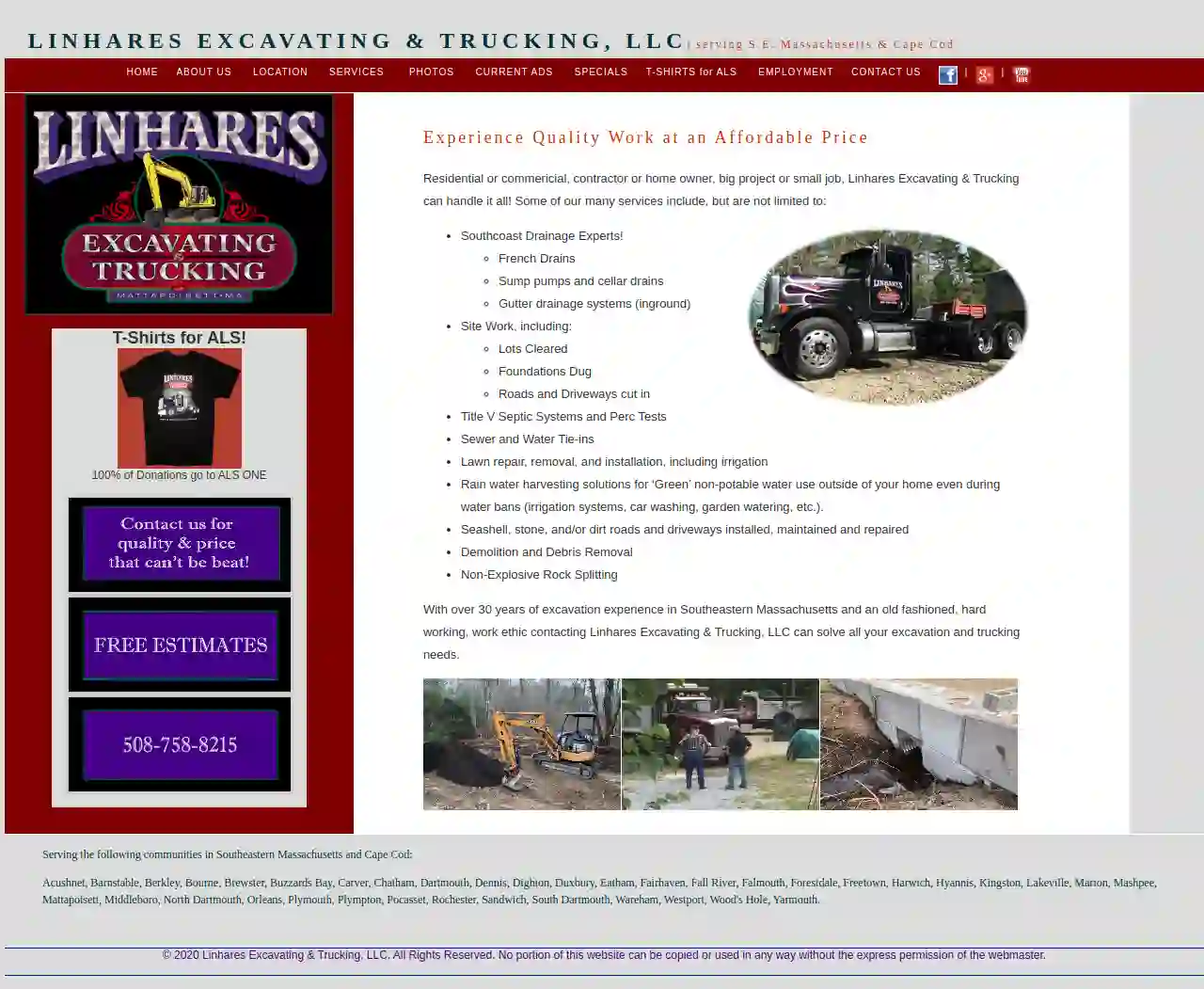
Linhares Excavating & Trucking, LLC
52 reviewsMattapoisett, USLinhares Excavating & Trucking, LLC: Your Trusted Partner for Excavation and Trucking Needs in Southeastern Massachusetts and Cape Cod For over 30 years, Linhares Excavating & Trucking, LLC has been a leading provider of excavation and trucking services in Southeastern Massachusetts and Cape Cod. We are a family-owned and operated business with a strong commitment to quality, customer satisfaction, and a dedication to providing our clients with the best possible experience. Whether you're a homeowner, contractor, or business owner, we have the expertise and resources to handle any project, big or small. Our team of experienced professionals is dedicated to providing you with the highest quality workmanship and exceptional customer service. We understand that your project is important to you, and we're committed to working with you every step of the way to ensure your complete satisfaction. We take pride in our commitment to safety and environmental responsibility. We use the latest equipment and techniques to ensure that all our projects are completed on time and within budget, while minimizing our impact on the environment. Contact us today for a free estimate and let us show you why Linhares Excavating & Trucking, LLC is the right choice for all your excavation and trucking needs.
- Services
- Why Us?
- Gallery
Get Quote
Buraq Construction Inc
571 reviews1307 Foster Ave, Brooklyn, 11230, USAbout Us Buraq Construction Company was established to offer general construction business in New York City, and has been giving excellent service for more than 10 years. We are the specialists in luxury construction services of the highest standard and safety while keeping up the same standards and quality. Our experienced team is well-versed in navigating the complexities of city regulations and addressing violations efficiently and effectively.
- Services
- Why Us?
- Gallery
Get Quote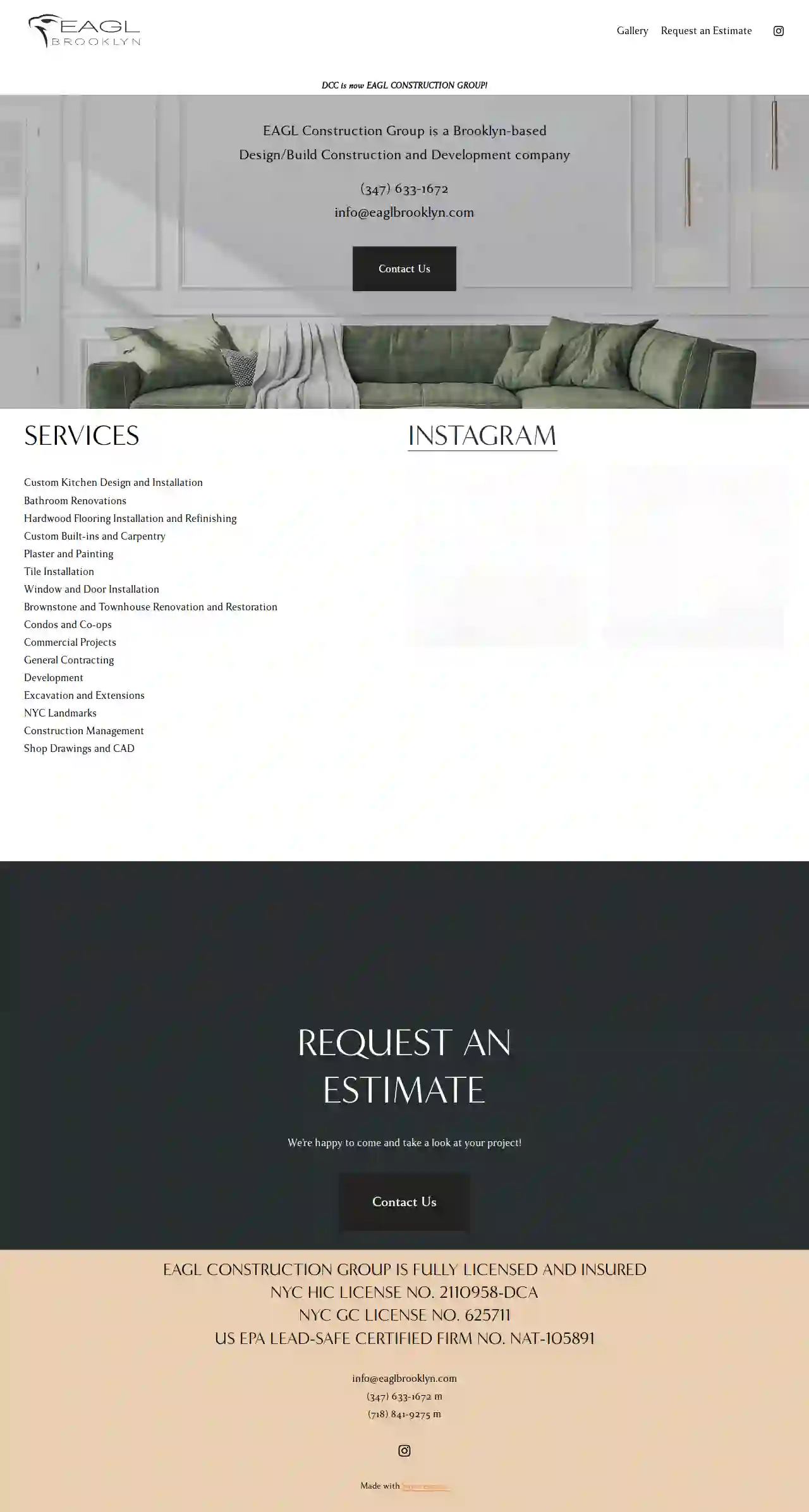
EAGL Construction Group LLC
52 reviewsBrooklyn, USEAGL Construction Group is a Brooklyn-based Design/Build Construction and Development company. We specialize in a wide range of services, from custom kitchen design and installation to bathroom renovations, hardwood flooring, and more. We also offer general contracting, development, excavation, and extensions for both residential and commercial projects. Our team of experienced professionals is dedicated to providing our clients with the highest quality workmanship and customer service. We are fully licensed and insured, and we are committed to exceeding your expectations. Whether you are looking to renovate your bathroom, build a new kitchen, or simply need help with a small repair, EAGL Construction Group is here to help. Contact us today for a free consultation.
- Services
- Why Us?
- Gallery
Get Quote
Lehigh Construction Group, Inc.
4.26 reviews4327 S Taylor Road, Orchard Park, 14127, USProviding a full array of Construction, Maintenance and Repair Services to meet Client Construction Needs. A trusted commercial general contractor for Buffalo and WNY delivering construction services with two mainstay principles in mind: WORK HARD and TREAT PEOPLE RIGHT. Our team lives by these principles as we strive to deliver the best customer experience - safely & on-time. Smarter Solutions Providing clients with customized construction building services & emphasizing speed-to-market in an environment of trust, collaboration, and transparency for 40 years. Lehigh Project Building Repairs & Maintenance Lehigh PRO service vans are equipped to handle any small construction job. Lehigh PRO performs thousands of building repairs and facility maintenance jobs as one of Buffalo's trusted building repair and facility maintenance providers. Lehigh Pro Emergency Repairs Lehigh PRO emergency repair services provide quick-response maintenance & repair options. As general contractors, PRO crews take steps to ensure work is completed in a safe and timely manner. Lehigh Industrial Services Industrial Plant Small Construction The Lehigh Industrial Services team is fully equipped to handle any plant construction job and our industrial experience with concrete, steel & metal, masonry and sitework sets us apart. Customers include industrial manufacturing plants, chemical, pharmaceutical, agri-business and warehouse & distribution. Get to Know Lehigh Safety Safety is a Lehigh Core Value. Our philosophy remains unchanged – send everyone home safely to their family every day. We remain on the cutting edge of construction industry safety standards and practices by maintaining our commitment to training and educating employees so they perform in the safest manner possible. History Lehigh Construction Group, Inc. was founded in 1984 by Dave Knauss and Tom Glomb as commercial general contractors for Buffalo and Western New York businesses. Over 40 years later we have grown into one of Buffalo’s most trusted commercial general contractors, offering a full array of commercial construction services. From small scale building maintenance repairs to new-builds & plant additions, Lehigh provides expertise in all aspects of construction. Let us be your commercial general contractor.
- Services
- Why Us?
- Gallery
Get Quote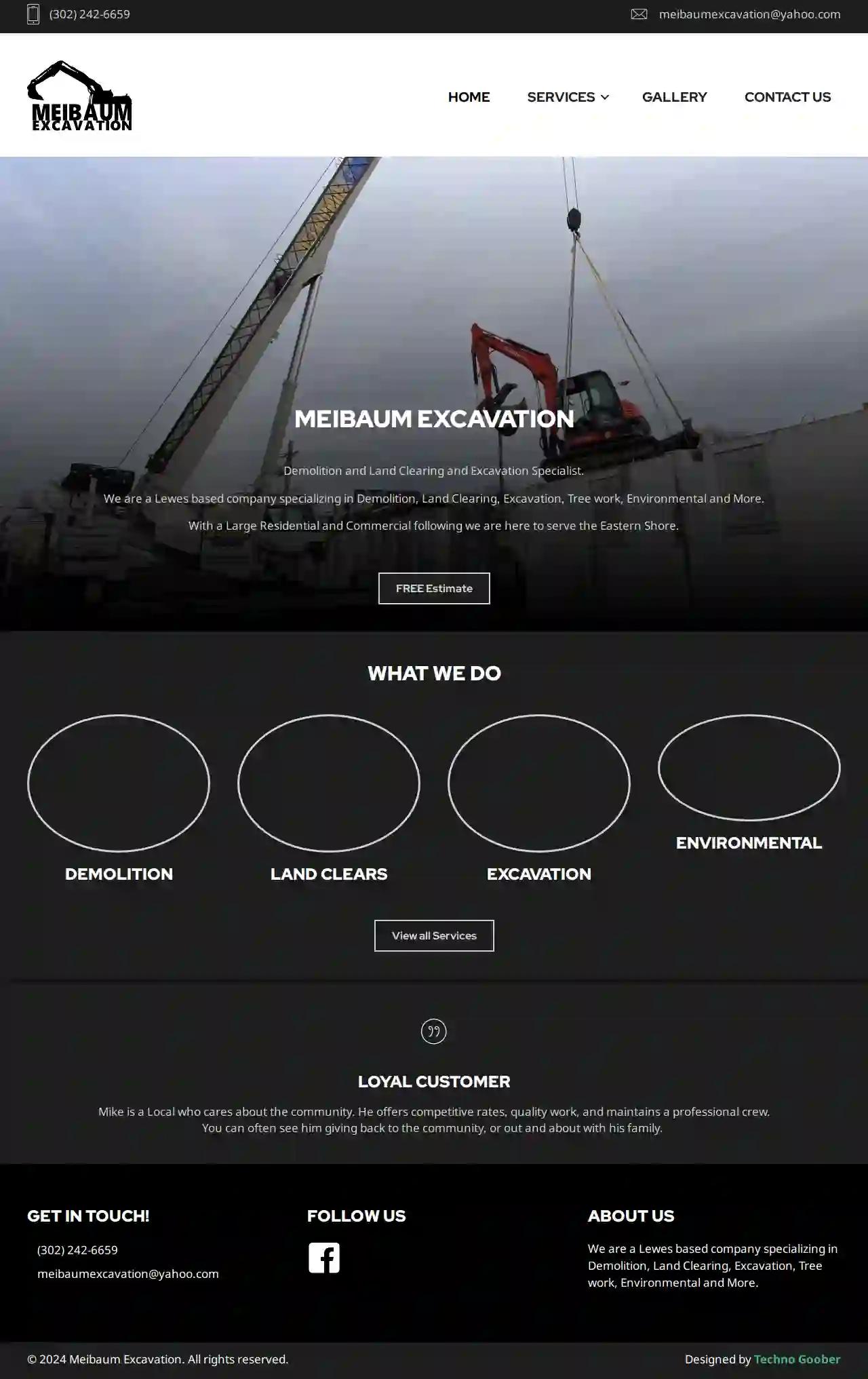
Meibaum Excavation
534 reviewsNew York, USMeibaum Excavation: Your Trusted Partner for Demolition, Land Clearing, and Excavation Meibaum Excavation is a Lewes-based company dedicated to providing top-notch demolition, land clearing, excavation, tree work, environmental services, and more. We have a strong reputation for serving both residential and commercial clients across the Eastern Shore. Our team is committed to delivering high-quality work, competitive rates, and a professional approach. We are proud to be a part of the community and strive to give back whenever possible. Whether you need to demolish a multi-story home, clear land for a new development, or excavate for a basement, Meibaum Excavation has the expertise and experience to handle your project efficiently and effectively. We are committed to safety and environmental responsibility, ensuring that all our work is completed to the highest standards. Contact us today for a free estimate and let us help you bring your vision to life.
- Services
- Why Us?
- Testimonials
- Gallery
Get Quote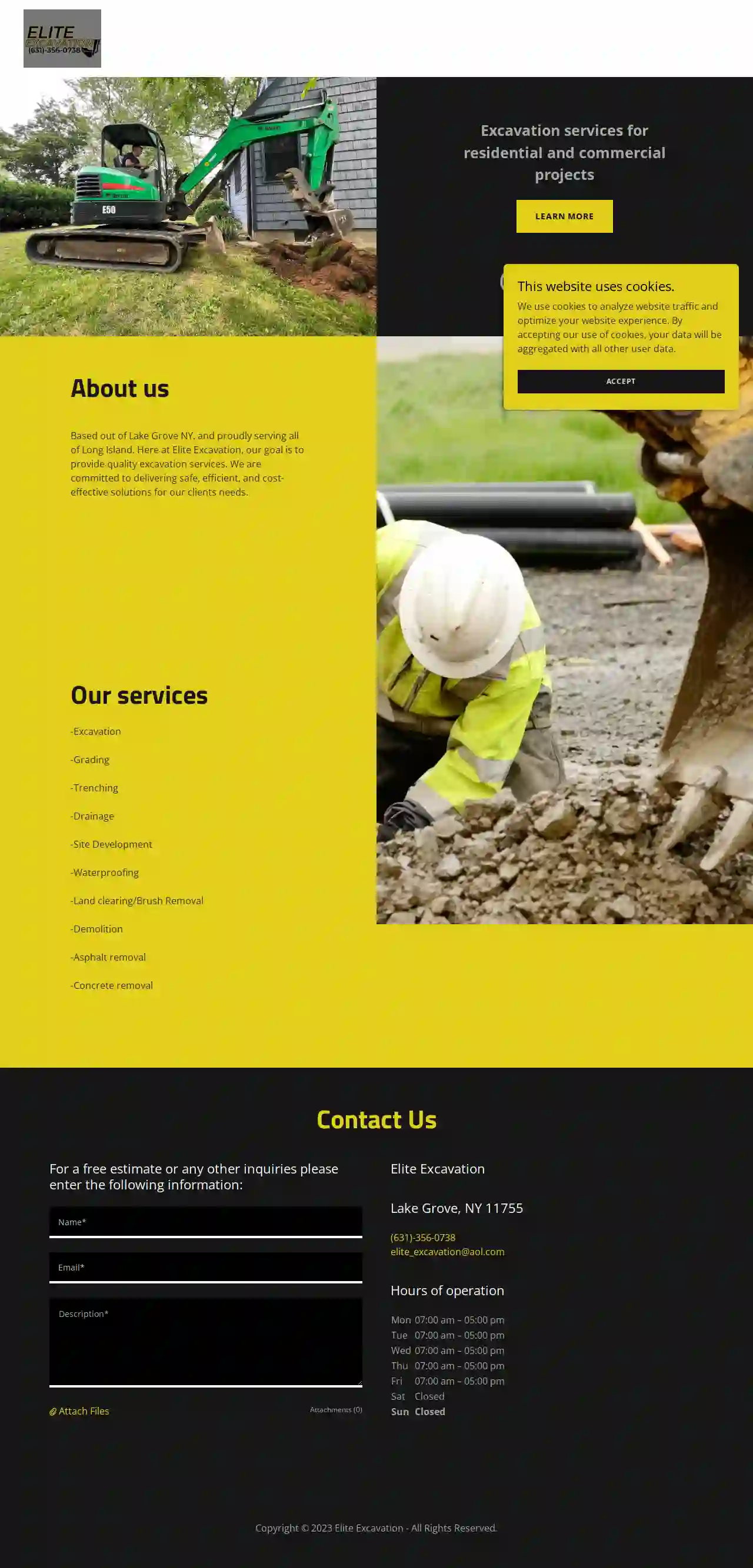
Elite Excavation
51 reviewsLake Grove, NY, 11755, USAbout us Based out of Lake Grove NY, and proudly serving all of Long Island. Here at Elite Excavation, our goal is to provide quality excavation services. We are committed to delivering safe, efficient, and cost-effective solutions for our clients' needs.
- Services
- Why Us?
- Gallery
Get Quote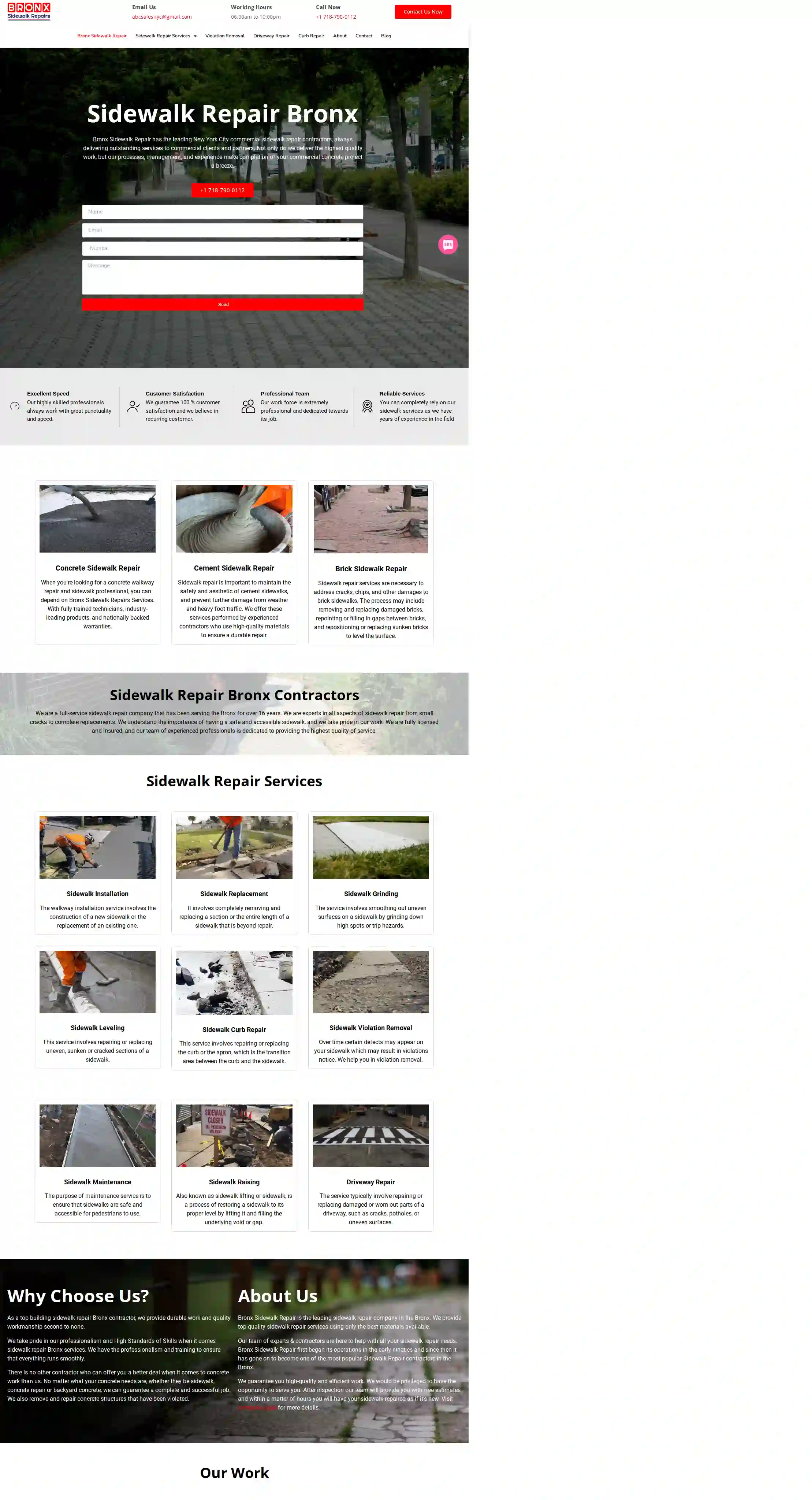
Bronx Sidewalk Repair
4.913 reviewsBronx, New York, USBronx Sidewalk Repair: Your Trusted Partner for Safe and Durable Sidewalks Bronx Sidewalk Repair stands as a leading provider of commercial sidewalk repair services in New York City. We are dedicated to delivering exceptional service to our valued commercial clients and partners. Our commitment extends beyond delivering high-quality work; we prioritize efficient processes, expert management, and extensive experience to ensure your commercial concrete project is a seamless success. Why Choose Bronx Sidewalk Repair? Excellent Speed Our highly skilled professionals are committed to working with exceptional punctuality and speed. Professional Team Our workforce is exceptionally professional and dedicated to their work. Customer Satisfaction We guarantee 100% customer satisfaction and believe in fostering long-term relationships with our clients. Reliable Services You can confidently rely on our sidewalk services, backed by years of experience in the field.
- Services
- Why Us?
- Gallery
Get Quote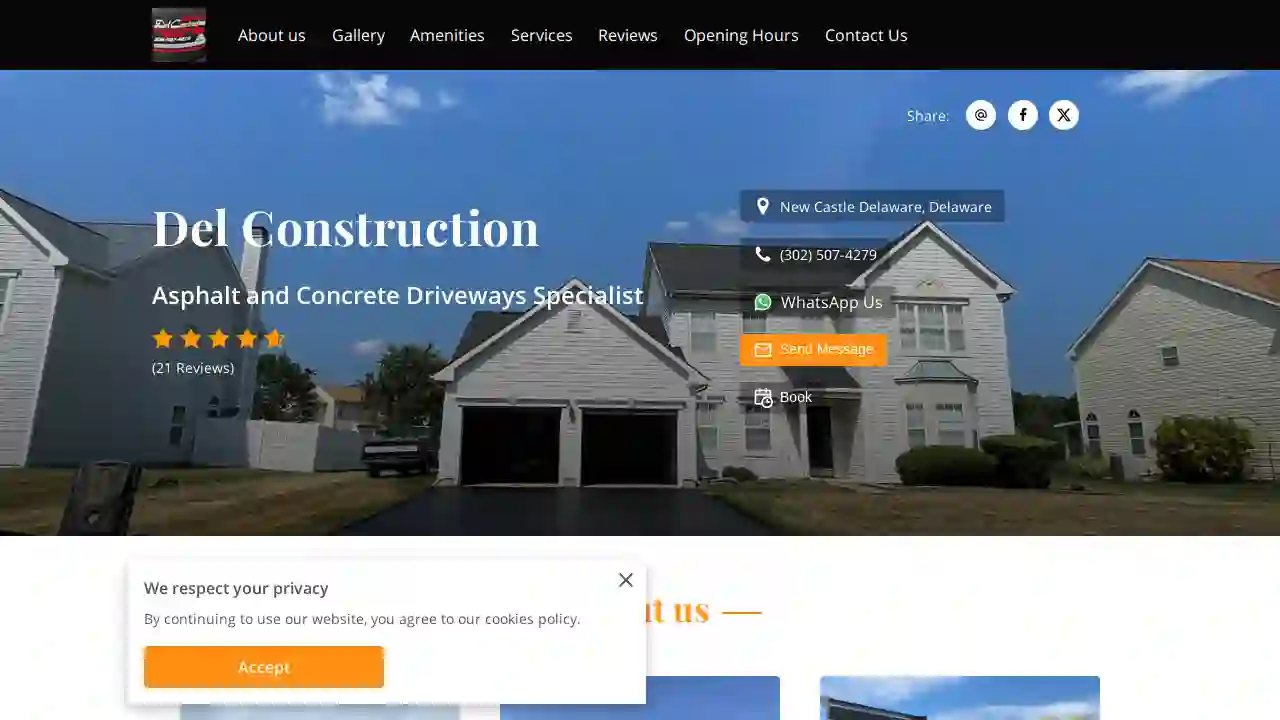
Del Construction
4.621 reviewsNew Castle, USAbout Our Business We are a local business that prides ourselves on delivering exceptional workmanship and the very best customer service. We’ve built up a reputation for a high standard of work and a commitment to customer satisfaction. We are fully licensed and insured, and we offer free estimates on all of our services. Our Equipment We have a variety of top of the line equipment we use for our services, including larger machines for sizable, complex projects and also smaller equipment for more intricate jobs. We are constantly investing in new equipment to ensure that we can provide the best possible service to our customers.
- Services
- Why Us?
- Testimonials
- Gallery
Get Quote
RND Construction
54 reviewsLocust Grove, Virginia, USServing Fredericksburg, VA & Surrounding Communities for Over 40 Years At RND Construction, we offer top tier excavation, land clearing and commercial construction services. We work diligently to meet our customer’s needs while adhering to industry standards in quality and safety. We are committed to completing our work with diligence and with extreme attention to detail. RND Construction is your top choice when it is time for your next job. Contact us today, our team is waiting to assist you! Expert & Professional Services Here at RND Construction we provide comprehensive services for homeowners and business owners across Fredericksburg, Virginia and the surrounding communities. We are experts in our field and are dedicated to providing superior workmanship and customer support. With over 40 years of professional experience, customer satisfaction is always our top priority.
- Services
- Why Us?
- Testimonials
- Gallery
Get Quote- Mc
McNeight Excavating
4.824 reviewsBuffalo, USWe are a family-owned and operated excavating company serving the [CITY] area. We have been in business for over 20 years and have a proven track record of providing high-quality services at competitive prices. We specialize in a wide range of excavating services, including site preparation, foundation work, utility installation, and more. We are committed to providing our clients with the highest level of customer service and satisfaction. We are fully insured and bonded, and we use only the latest equipment and technology to ensure that all of our projects are completed on time and within budget. Contact us today for a free estimate.
- Services
- Why Us?
- Gallery
Get Quote
Over 22,076+ Excavation Pros onboarded
Our excavation companies operate in Paris and surrounding areas!
ExcavationHQ has curated and vetted the Best Excavation Businesses in Paris. Find the most reliable pro today.
Frequently Asked Questions About Demolition Contractors
- Experience: Look for companies with a proven track record and years of experience in the demolition industry.
- Licensing and Insurance: Ensure the contractor is properly licensed to operate in your area and carries adequate insurance to protect you from liability.
- Safety Record: Inquire about their safety protocols and accident history. A reputable contractor prioritizes safety.
- References and Reviews: Ask for references from past clients and check online reviews to gauge their reputation and customer satisfaction.
- Professionalism: Choose a company that communicates clearly, provides detailed estimates, and has a courteous and responsive team.
- Recycling: Concrete, brick, metal, and wood can be recycled and reused in other construction projects, reducing waste sent to landfills.
- Landfill Disposal: Non-recyclable materials are disposed of in designated landfills according to local regulations.
- Donation: Some materials, such as fixtures or appliances, may be suitable for donation to charitable organizations.
How do I find a reputable demolition contractor?
How do I find demolition contractors near me?
Can I do demolition myself?
What happens to the debris after demolition?
How do I find a reputable demolition contractor?
- Experience: Look for companies with a proven track record and years of experience in the demolition industry.
- Licensing and Insurance: Ensure the contractor is properly licensed to operate in your area and carries adequate insurance to protect you from liability.
- Safety Record: Inquire about their safety protocols and accident history. A reputable contractor prioritizes safety.
- References and Reviews: Ask for references from past clients and check online reviews to gauge their reputation and customer satisfaction.
- Professionalism: Choose a company that communicates clearly, provides detailed estimates, and has a courteous and responsive team.
How do I find demolition contractors near me?
Can I do demolition myself?
What happens to the debris after demolition?
- Recycling: Concrete, brick, metal, and wood can be recycled and reused in other construction projects, reducing waste sent to landfills.
- Landfill Disposal: Non-recyclable materials are disposed of in designated landfills according to local regulations.
- Donation: Some materials, such as fixtures or appliances, may be suitable for donation to charitable organizations.